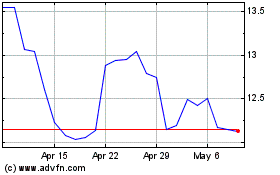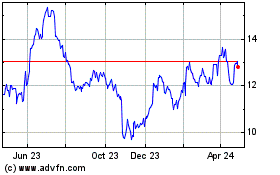By Christina Rogers
For the better part of a decade, "One Ford" served as the battle
cry of the No. 2 U.S. auto maker.
The slogan, coined by former Chief Executive Alan Mulally, was
shorthand for the painful downsizing and management overhauls that
helped Ford Motor Co. avoid bankruptcy and return to big
profits.
Now, as the auto industry braces for the rise of electric and
self-driving vehicles, Mr. Mulally's successor, Mark Fields, is
pivoting toward Two Fords, recasting the company as an auto maker
and a transportation-services provider.
Mr. Fields kicked off an investor meeting last month by saying
One Ford was "foundational," but that the company had to "evolve."
In recent months, it has launched a series of investments and
partnerships in areas like self-driving automobiles, electrified
vehicles and ride sharing.
Those efforts have done little to raise the company's stock,
which has fallen by roughly 30%since Mr. Fields took over in
mid-2014, despite record earnings last year. Investors appear more
focused on plateauing U.S. auto sales and the company's weakening
near-term profit outlook. Some market watchers also say it isn't
clear how the new initiatives will mesh strategically.
"They have a lot of the right initiatives; they're doing
something in every box," said Barclays auto analyst Brian Johnson.
"The difference from the Mulally days is there isn't a single
message that is more than just public-relations, tying it all
together."
Under Mr. Mulally, the message was clear, industry insiders say:
Ford was to unite around a common goal, returning to the basics of
auto making. He sought to compel senior executive to abandon years
of infighting and fiefdom-building and pull together to develop
more appealing and fuel-efficient products.
Mr. Fields, by contrast has broadened the company's mission,
aiming to better position the company to take on new Silicon Valley
rivals, such as Tesla Motors Inc. and Alphabet Inc.'s Google,
looking to redefine the car business.
Ford recently bought a stake in a laser-sensor maker, has teamed
up with a bike-sharing firm, and has purchased a van-shuttle
service. The new ventures are part of a unit called Ford Smart
Mobility LLC.
The company plans to invest $4.5 billion through 2020 in
electrified vehicles, and expects profits to drop through 2017
partly because of investments and acquisitions related to its new
transportation services.
"We've been quite explicit about where we want to place our
bets," said Ford Chief Financial Officer Bob Shanks, in an
interview, adding that analysts' feedback has been generally
positive on the plans.
Still, concerns that auto-industry profits have peaked are
hurting auto stocks across the sector, not just at Ford, Mr. Shanks
added.
Mr. Shanks said the new ventures -- which Ford views as an
"extension" of One Ford, building on the core auto business --
could eventually deliver margins of 20% or more, but the payoff
won't occur until the next decade.
"If I were an investor, I would be equally concerned if someone
with our size and capability wasn't doing something," Mr. Shanks
said.
Frank Giamboy, a Wilmington, Del., financial adviser who has
held Ford stock for 15 years, said he remains bullish on the
company and recommends Ford to clients -- in part for the nearly 5%
dividend yield -- but is frustrated the stock isn't preforming
better. "Somewhere along the line, we've got to see results," he
said.
Tasha Keeney, an analyst for ARK Investment Management's
Industrial Innovation Fund, said there are better options than Ford
for investors who want to bet on the future of the car
business.
Ms. Keeney's fund has positions in Tesla, whichplans to roll out
a $35,000, long-range electric car next year, and Volkswagen AG,
which is plowing money into electric vehicles in the wake of its
emissions-cheating scandal. Alphabet, whose Google unit has more
than 2 million miles of autonomous-vehicle testing under its belt,
is another of the fund's investments.
Ms. Keeney said she tracks Ford closely, but her firm doesn't
hold its stock. She pointed to its lack of a long-range electric
car that could compete head-on with Tesla. And, with many of Ford's
rivals phasing in automated-driving advances in next few years, she
said Mr. Fields's goal of having a fully autonomous car by 2021 is
"a bit late."
Mr. Fields has said the company isn't in a race to make
announcements and wants to move straight to offering a fully
driverless car, because it believes that is a safer route.
Positioning Ford for the future isn't the first big challenge
Mr. Fields has faced. Earlier in his career he engineered a
comeback of Ford's European operation. In 2005, he overhauled the
company's hemorrhaging North American business through deep job
cuts and plant closures.
To succeed in his latest mission, Mr. Field needs to take bolder
action, said Jack Mohr, a co-manager of the charitable trust
belonging to CNBC's "Mad Money" host Jim Cramer, who was a vocal
supporter of Mr. Mulally's turnaround. Ford's stock "would be much
more own-able if management expressed a cohesive narrative or game
plan," said Mr. Mohr.
He said the Cramer trust, which doesn't hold Ford shares, is
making its auto-industry plays indirectly through investments in
NXP Semiconductors NV, which supplies chips to the industry, and
Alcoa Inc., which makes lightweight aluminum used in many vehicles,
including Ford's F-150 truck.
(END) Dow Jones Newswires
October 17, 2016 05:44 ET (09:44 GMT)
Copyright (c) 2016 Dow Jones & Company, Inc.
Ford Motor (NYSE:F)
Historical Stock Chart
From Mar 2024 to Apr 2024

Ford Motor (NYSE:F)
Historical Stock Chart
From Apr 2023 to Apr 2024
